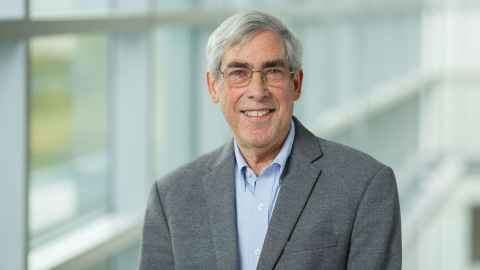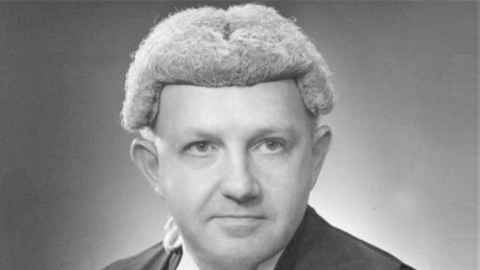Big ideas behind old report offer hope for modern-day threats
16 October 2023
Radical concepts presented by the 'father of ACC' in the 60s should be used to address contemporary challenges such as climate change and public health issues, says Richard Gaskins.

The relevance of Sir Owen Woodhouse's groundbreaking 1967 report is examined with a modern-day lens in an upcoming talk by visiting professor, Woodhouse Fellow Richard Gaskins.
Sir Owen Woodhouse, dubbed the ‘father of ACC’, made a significant contribution to Aotearoa during his lifetime and is best known for chairing the Royal Commission on Personal Injury in New Zealand from 1966 to 1967.
The outcome, known as the Woodhouse Report, recommended that the country introduce a no-fault accident compensation scheme. The scheme continues today and is internationally renowned as a major innovation.
However, Woodhouse's groundbreaking ideas from the report can and should be used to address contemporary challenges such as climate change and public health issues, says Gaskins, Professor Emeritus at Boston's Brandeis University.
"There are some very big ideas behind the accident compensation discussion, which are not particularly legal, but economic and social. It's a comprehensive framework that Sir Owen Woodhouse constructed, and there's a deeper level to these Woodhouse ideas."
The radical principles behind the 1967 Woodhouse Report were eclipsed by shifting political styles and gradually abandoned, says Gaskins, who began comparative work on the ACC scheme in 1975 and met with Sir Owen Woodhouse in Philadelphia in 1979.
"When Sir Owen was writing the report, it was a time when a lot of scholarship and public policy was turning to market systems. The neoliberal movement was starting up, and these larger Woodhouse concepts of ecological economics and public health were quite incompatible with the dominant thoughts of the time," he says.
“So an important reason for digging into the background of Sir Owen's work is to reach back some 50 years, before the rise of neoliberalism, and reconnect with clear alternative principles--reminding us of roads not taken.
“Owen was aware that his ideas about accident compensation were dismissed as heretical in other countries because they didn't pay attention to market mechanisms. But the question is whether these heretical ideas of Sir Owen's have the potential to become a new orthodoxy?"
Sir Owen's notion, says Gaskins, that "the apparent heresies of one generation become the orthodoxies of the next" can encourage us to explore how core Woodhouse heresies might provide fresh support for a generation grappling with climate change and pandemic control.

The notion of uncompensated social costs, a key aspect of the Woodhouse report, is evident when we talk about climate change.
"This sets up a kind of social imperative that some kind of remedy has to happen. And that's the principle of community responsibility, which is a pivotal concept in the 1967 report. You can't sit back and do nothing because the costs are being incurred day by day."
Gaskins says it's disheartening that political discussion hasn't caught up with the very morally urgent approach that Woodhouse took.
Woodhouse's once-radical framework could inspire modern solutions to global problems, and by understanding his approach, we can seek bolder, more comprehensive actions against the pressing issues of our time, he says.
"Going back and examining his ideas can help us understand how we might move forward."
As part of the Sir Owen Woodhouse Memorial Fellowship and associated lectures, Professor Gaskins will present ‘Woodhouse Heresies’ in both Wellington and Auckland this October.
University of Auckland
Where: Auckland Law School (9 Eden Crescent)
When: 25 October, 6:00pm: Welcome – refreshments, 6:30pm: Lecture begins
Reserve a spot
Media contact:
Sophie Boladeras
M: 022 4600 388
E: sophie.boladeras@auckland.ac.nz